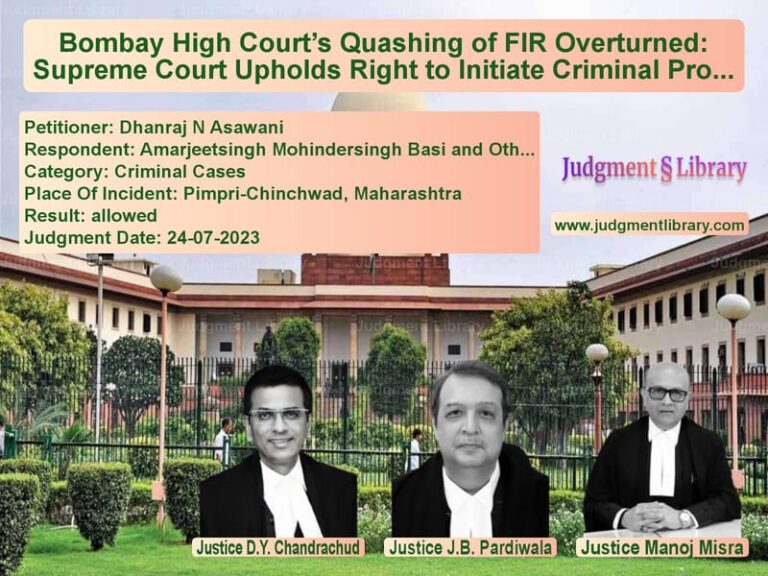Corruption in Educational Institutions: Supreme Court Clarifies Applicability of Prevention of Corruption Act
The Supreme Court of India recently ruled on a critical case regarding corruption in educational institutions in State of Gujarat vs. Mansukhbhai Kanjibhai Shah. The case revolved around whether a trustee of a ‘deemed to be university’ could be considered a public servant under the Prevention of Corruption Act, 1988 (PC Act). The ruling set a significant precedent in determining the scope of anti-corruption laws in private educational institutions performing public functions.
Background of the Case
The case originated from an FIR filed by Dr. Jasminaben, whose daughter was admitted to the MBBS course at Sumandeep Vidyapeeth, a deemed university. In 2017, when her daughter was about to appear for her final examinations, the complainant was allegedly asked to pay a bribe of Rs. 20 lakhs to the respondent, Mansukhbhai Kanjibhai Shah, a trustee of Sumandeep Charitable Trust, which ran the university. The payment was demanded in exchange for allowing her daughter to appear for the examination.
After an anti-corruption trap was conducted, the authorities recovered multiple cheques amounting to over Rs. 100 crores. The chargesheet filed against the accused included offenses under Sections 7, 8, 10, and 13 of the PC Act, read with Section 109 of the Indian Penal Code (IPC).
Key Legal Issues Raised
- Whether a trustee of a ‘deemed to be university’ qualifies as a public servant under the Prevention of Corruption Act, 1988.
- Whether the Gujarat High Court was justified in discharging the accused under Section 227 of the Code of Criminal Procedure (CrPC).
- Whether private educational institutions performing public functions should be subject to anti-corruption laws.
Arguments by the Appellant (State of Gujarat)
The prosecution contended:
- Universities, including deemed universities, perform a public function by granting degrees, which have legal recognition.
- The Prevention of Corruption Act must be construed liberally to include individuals holding influential positions in institutions that provide education to the public.
- The trustee’s role in the university included making decisions related to admissions and examinations, which constituted a public duty.
- Accepting illegal gratification in exchange for allowing students to appear for exams amounted to corruption within the meaning of the PC Act.
Arguments by the Respondent (Mansukhbhai Kanjibhai Shah)
The defense argued:
- The accused was a trustee of the university and not an employee or an officer holding an official position.
- Deemed universities do not fall within the definition of ‘university’ under the Prevention of Corruption Act.
- The High Court was correct in its strict interpretation of criminal statutes, as they must be construed in favor of the accused.
- No formal government authority controlled the university, and the accused’s role was limited to the trust’s administrative affairs.
Supreme Court’s Analysis and Judgment
The Supreme Court considered whether a deemed to be university should be included within the definition of ‘university’ under the PC Act and whether trustees could be treated as public servants.
- The Court referred to the definition of ‘public servant’ under Section 2(c)(xi) of the PC Act, which includes Vice-Chancellors, professors, and other employees of universities.
- It held that a deemed university performs the same functions as a statutory university, making it subject to anti-corruption laws.
- The Court observed: “Corruption in education is a grave concern, and individuals in positions of power in educational institutions must be held accountable.”
- The Court ruled that the respondent was responsible for exercising public functions related to education and student affairs, making him a public servant under the PC Act.
- The Gujarat High Court’s decision to discharge the accused under Section 227 of the CrPC was overturned.
Key Takeaways from the Judgment
- Expanded Scope of Public Servants: The ruling clarifies that individuals exercising control over deemed universities are subject to anti-corruption laws.
- Education as a Public Function: The judgment affirms that educational institutions, though privately managed, perform a public duty.
- Strict Anti-Corruption Enforcement: The Court reinforced that corruption in education is a serious offense warranting strict legal action.
- Trustees and Governing Members Liable: Individuals involved in the administration of educational institutions cannot escape liability merely by holding private positions.
Conclusion
The Supreme Court’s ruling in State of Gujarat vs. Mansukhbhai Kanjibhai Shah is a landmark decision that strengthens the legal framework against corruption in the education sector. By holding that a trustee of a deemed university is a public servant under the PC Act, the Court has ensured that those in power within educational institutions cannot misuse their authority for personal gain.
The ruling will serve as a precedent for future cases involving corruption in private educational institutions performing public duties, reinforcing the judiciary’s commitment to upholding transparency and accountability in education.
Petitioner Name: State of Gujarat.Respondent Name: Mansukhbhai Kanjibhai Shah.Judgment By: Justice N.V. Ramana, Justice Mohan M. Shantanagoudar, Justice Ajay Rastogi.Place Of Incident: Vadodara, Gujarat.Judgment Date: 27-04-2020.
Don’t miss out on the full details! Download the complete judgment in PDF format below and gain valuable insights instantly!
Download Judgment: State of Gujarat vs Mansukhbhai Kanjibha Supreme Court of India Judgment Dated 27-04-2020.pdf
Direct Downlaod Judgment: Direct downlaod this Judgment
See all petitions in Fraud and Forgery
See all petitions in Extortion and Blackmail
See all petitions in Public Interest Litigation
See all petitions in Judgment by N.V. Ramana
See all petitions in Judgment by Mohan M. Shantanagoudar
See all petitions in Judgment by Ajay Rastogi
See all petitions in allowed
See all petitions in Quashed
See all petitions in supreme court of India judgments April 2020
See all petitions in 2020 judgments
See all posts in Criminal Cases Category
See all allowed petitions in Criminal Cases Category
See all Dismissed petitions in Criminal Cases Category
See all partially allowed petitions in Criminal Cases Category







